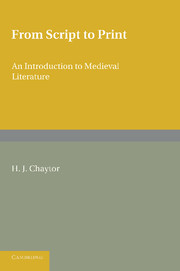Book contents
Chapter III - Language and Nationality
Published online by Cambridge University Press: 05 June 2016
Summary
MEDIEVAL and modern times are in striking contrast in their attitude towards language, regarded as a mark of nationality. Nothing could be less medieval than the exhortation of the schoolmaster, M. Hamel, in Daudet's conte, La Dernière Classe, delivered when German was to become the official and compulsory language of Alsace-Lorraine: 'il se mit à nous parler de la langue française, disant que c'etait la plus belle langue du monde, la plus claire, la plus solide; qu'il fallait la garder entre nous et ne jamais l'oublier, parce que, quand un peuple tombe esclave, tant qu'il tient bien sa langue, c'est comme s'il tenait la clef de sa prison'. Language had little or no political significance in the middle ages. No ruler dreamt of attempting to suppress one language in order to impose another upon a conquered race. Such prohibitions as have affected Poland, Alsace-Lorraine, Czecho-Slovakia, Tirol, in the immediate past, are modern innovations. Rome never regarded language as a bone of political contention. Under the Roman Empire the use and spread of Greek was unrestricted. Cicero could address the Syracusan senate in Greek; Greek inscriptions of the seventh century A.D. have been found as near to Rome as Naples, and the debt of Christianity to the kovιή, the vernacular of the Levant, is beyond calculation. Of other languages it may be said, in Tibrim defluxit Orontes, without let or hindrance. Nor did the Romans make any attempt to impose their Latin upon subject races by the suppression of vernacular tongues. Celtic and Iberian died out and were supplanted by Latin in Gaul and Spain, not only because Latin was the official and legal language, but also because it was the language of a higher and more attractive civilisation. Spanish tribesmen were eager to be latinised;Sertorius, of all people, set up a Latin school for young nobles at Huesca about A.D. 80, and the long list of eminent writers and administrators of Spanish and Celtic extraction which succeeding centuries can show is sufficient evidence of the readiness with which these peoples accepted Roman culture. In the middle ages, the sense of universalism, the acceptance of the Empire, of the Catholic Church and of Latin as its official language outweighed any sense of national feeling that might have inspired respect for a vernacular. Walther von der Vogelweide thinks of the Empire as a political, not as a linguistic unity.
- Type
- Chapter
- Information
- From Script to PrintAn Introduction to Medieval Literature, pp. 22 - 47Publisher: Cambridge University PressPrint publication year: 2013



